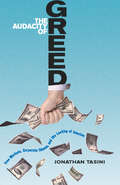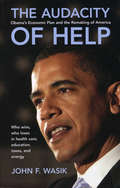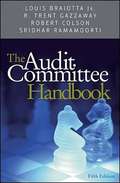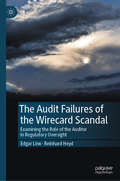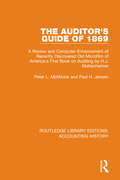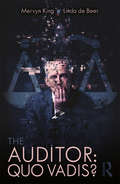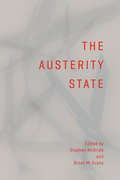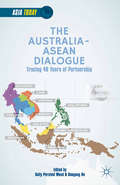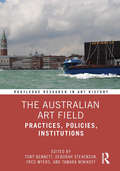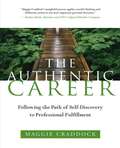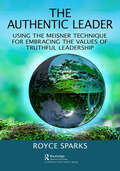- Table View
- List View
The Audacity of Greed
by Jonathan TasiniOver the past quarter century, we have lived through the greatest looting of wealth in human history. While billions of dollars streamed into the pockets of a few elites in the corporate and economic class, the vast majority of citizens have lived through a period of falling wages, disappearing pensions, and dwindling bank accounts--all of which lead to the personal debt crisis that lies at the root of the current financial meltdown. This "audacity of greed" was legally blessed by the ethos of the "free market," a phony marketing phrase that covered up the fleecing of the American public.In The Audacity of Greed, Jonathan Tasini examines the reasons and exposes the people responsible for the looting of America--from Wall Street executives who funded their lavish lifestyles at the public's expense to the politicians who let it happen--arguing that we need a cultural and philosophical revolution that punctures the fable of market fundamentalism and, by doing so, values the contributions made by ordinary Americans throughout the economy.Jonathan Tasini is executive director of the Labor Research Association. The longtime president of the National Writers Union, he was the lead plaintiff in Tasini vs. The New York Times, the landmark electronic rights case that took on the corporate media's assault on the rights of freelance authors. In 2006 he ran against Hillary Clinton for the Democratic nomination for the US Senate in New York. He has written about labor and economics for a variety of publications including The New York Times Magazine, The Washington Post, Los Angeles Times, and The Wall Street Journal, and has appeared on CNBC and Fox News.
The Audacity of Help: Obama's Stimulus Plan and the Remaking of America (Bloomberg #24)
by John F. WasikThe United States confronts its greatest economic crisis since the 1930s. President Obama has taken quick and decisive action to enact an economic stimulus package strong enough to address problems of historic proportions. What does this new package mean for American families, businesses, investors, and taxpayers? The Audacity of Help unrolls the blueprints and offers insights on how the economic stimulus package—as passed by Congress and signed into law by President Obama—will affect healthcare, education, the environment, energy, taxes, and more. The book includes analysis of sectors and industries that will benefit, as well as those that will not. Wasik's conclusions are firmly grounded in a comprehensive and enlightening evaluation of the final economic package passed into law. Extensive study and interviews with experts from each economic sector support his analysis.
The Audacity to Be Queen: The Unapologetic Art of Dreaming Big and Manifesting Your Most Fabulous Life
by Gina DeVeeIn the tradition of You Are a Badass, women's empowerment coach Gina DeVee shares motivational steps for how to become the queen of your own life. In every woman lives a Queen who is confident, poised, and clear on her calling. She is bold and unapologetic. Drawing from her spiritual connection and feminine nature, she accesses the power to manifest her desires and fulfill her purpose. The era of invisible women is over. Your time to be Queen has arrived. In The Audacity to Be Queen, women's empowerment and success coach Gina DeVee invites modern-day women to embrace the endless possibilities that are rightfully ours. Permission granted to take ourselves off the back burner financially, romantically, physically, and socially-and step into our greatness. The days of dismissing ourselves and our desires end here. No longer must we pretend to be anything other than brilliant, capable, and fabulous. The world needs women like us to own our power, raise our standards, and contribute our talents like never before. When a woman chooses to be a Queen, everyone benefits. With spectacular flair, beautiful pearls of wisdom, and lifechanging stories of unexpected triumph, The Audacity to BeQueen takes you on a journey to empower the Queen within. Gina DeVee shares the steps, exercises, meditations, prayers, and journal prompts to release all forms of self-doubt and self-sabotage so you can discover the best version of you. Only from the position of Queen can you fulfill your calling, and in this pivotal moment, time is of the essence. The age of the Queen is now.
The Audible Past: Cultural Origins of Sound Reproduction
by Jonathan SterneThe Audible Past explores the cultural origins of sound reproduction. It describes a distinctive sound culture that gave birth to the sound recording and the transmission devices so ubiquitous in modern life. With an ear for the unexpected, scholar and musician Jonathan Sterne uses the technological and cultural precursors of telephony, phonography, and radio as an entry point into a history of sound in its own right. Sterne studies the constantly shifting boundary between phenomena organized as "sound" and "not sound. " In The Audible Past, this history crisscrosses the liminal regions between bodies and machines, originals and copies, nature and culture, and life and death. Blending cultural studies and the history of communication technology, Sterne follows modern sound technologies back through a historical labyrinth. Along the way, he encounters capitalists and inventors, musicians and philosophers, embalmers and grave robbers, doctors and patients, deaf children and their teachers, professionals and hobbyists, folklorists and tribal singers. The Audible Past tracks the connections between the history of sound and the defining features of modernity: from developments in medicine, physics, and philosophy to the tumultuous shifts of industrial capitalism, colonialism, urbanization, modern technology, and the rise of a new middle class. A provocative history of sound, The Audible Past challenges theoretical commonplaces such as the philosophical privilege of the speaking subject, the visual bias in theories of modernity, and static descriptions of nature. It will interest those in cultural studies, media and communication studies, the new musicology, and the history of technology.
The Audit Committee Handbook
by Robert Colson Louis Braiotta Jr. Sridhar Ramamoorti R. Trent GazzawayThe classic handbook to audit committee responsibilities--completely updated to cover the latest guidance with practical insights on the new functions of the audit committee.Now containing the newest regulatory guidance impacting audit committees, including new chapters on audit oversight and updated discussions on fraud risk, the Fifth Edition helps your audit committee plan its agenda and achieve its mission in corporate governance.The Audit Committee Handbook, Fifth Edition guides you to:Understand the role and responsibilities of the audit committee with a general update and reality check on auditing cycle activitiesIdentify the developments that impact audit committee practices and the most current techniques and strategies for committee meetingsDevelop a repertoire of effective strategies to help the board of directors discharge its fiduciary responsibility to shareholdersPrepare a periodic assessment of professional development activities and an informed review of both audit processes and financial reporting processesA must-have for all audit committee members, board directors, corporate secretaries, CEOs, CFOs, and auditors involved in the accounting practices of their firms, The Audit Committee Handbook, Fifth Edition is the most authoritative work on audit committees in the marketplace.
The Audit Failures of the Wirecard Scandal: Examining the Role of the Auditor in Regulatory Oversight
by Edgar Löw Reinhard HeydWirecard was the largest economic scandal in the history of Germany. Following the collapse of Wirecard, numerous lawsuits, both criminal and civil by equity and debt investors, were filed not only against Wirecard but also against the auditor Ernst & Young. This book demonstrates that a proper audit in accordance with the auditing standards would have uncovered the fraud much earlier, and details what went wrong. The book first deals with the fundamentals of auditing and examines the Wirecard business models from a legal and economic perspective. Then, the book deals with the fiduciary structure, which there has been often debated. When the fraud was uncovered, it became clear that 1.9 billion Euros that were supposed to be in escrow accounts were not. The book discusses the balance sheet mapping in detail, including the related audit requirements and examines in which balance sheet item the amounts (allegedly) in escrow accounts should have been reported, before examining and weighing the corresponding income statement items. In each chapter, not only are the accounting requirements presented, but the requirements for audit measures based on the respective Standards on Auditing are highlighted and explained in detail. The book places the requirements for reporting in the context of the Wirecard case, and will be of interest to accountants, auditors, market regulators, and credit risk analysts alongside students of accounting/auditing.
The Audit Value Factor (Internal Audit and IT Audit)
by Daniel SamsonThe Audit Value Factor: Making Management’s Head Turn empowers readers with a systematic method to build and maintain a value-centric internal audit organization. The book explores how to identify, quantify, and articulate value for customers. It details six critical success factors: Value propositions that link directly to customer needs Fostering customer relationships using the CREATE model Talent development using the TEAM model Risk expertise that raises awareness, understanding, and action Change management and process optimization using the SMART model Data analytics that provide powerful insights to operations The Audit Value Factor offers easy to use tools and practical strategies that deliver tangible and immediate benefits for the internal audit team. Praise for The Audit Value Factor: Making Management’s Head Turn "Daniel Samson, the inspiring and forward-thinking CAE at SRI International, has created an essential guide to adding value through Internal Audit in his new book The Audit Value Factor. It's an important addition to any internal auditor's toolkit, with helpful suggestions on topics ranging from talent planning to data analytics. I highly recommend it to any internal audit professional looking to "up their game." Laurie A. Hanover, CIA, CAE Sunrun Inc. "Internal Auditors often strive for a ‘seat at the table,’ be it with Business Leaders, Senior Management, the Board, or really, any significant decision maker in an organization. In The Audit Value Factor, Dan Samson provides the roadmap to ensuring that Internal Audit gets not only that seat at the table, but also that role of a critical business partner that is valued in facilitating change and helping an organization achieve its goals." Brian Tremblay, CAE Acacia Communications "Great audit functions generate value and build leadership capacity from staff to CAE. The Audit Value Factor’s compelling examples, data, and actionable tools enable auditors at every level to build relationships of trust, ask the right questions, and deliver powerful insights to their organization." Dr. Kathryn Bingham, Executive Coach and CEO, LEADistics LLC
The Auditor's Guide of 1869: A Review and Computer Enhancement of Recently Discovered Old Microfilm of America's First Book on Auditing by H.J. Mettenheimer (Routledge Library Editions: Accounting History #7)
by Peter L. McMickle Paul H. JensenIn 1869 H.J. Mettenheimer wrote the Auditor’s Guide Being a Complete Exposition of Bookkeeper’s Frauds – the first book about auditing from the earliest period of American accountancy. The sole remaining copy was found to have been destroyed, leaving only a barely readable microfilmed photocopy. This book, first published in 1988, presents a restored Auditor’s Guide, finally available to historians of the early days of professional accountancy, together with the authors’ analysis of this important text.
The Auditor: Quo Vadis?
by Mervyn King Linda de BeerThe audit profession is at a tipping point. Without significant innovation in its business model, staff recruitment strategies and audit execution processes, the audit profession may not remain relevant in the 21st century. The number of claims against auditors has significantly increased over the past twenty years due to the spate of corporate and audit failures early in the 21st century (Enron, Worldcom, Parmalat, etc.). Regulation to monitor professional and ethical standards has increased, leading audit firms to feel under even more financial pressure. In addition, the investor community is calling for greater insight and foresight from auditors. These challenges, coupled with the unlimited liability regime of auditors still applicable in many jurisdictions, are making audit firms and regulators nervous as to the systemic risk of another one of the Big 4 failing. And yet, the audit profession is in place to protect businesses, their wider stakeholder groups, including clients and investors, and society at large. Therefore, this book asks the important question about the profession’s future and engages a broad readership in the discussion of audit failure and reform. Intended to help readers to get up to speed with the issues and possible solutions quickly, this book assists directors, investors, business people and regulators, especially those with a non-financial background, to gain a greater understanding of the challenges and threats being faced by the audit profession, which in turn could disrupt the capital market and affect businesses across the globe. The book outlines the critical success factors needed for a sustainable audit profession.
The Auditor’s Guide to Blockchain Technology: Architecture, Use Cases, Security and Assurance (Security, Audit and Leadership Series)
by Shaun AghiliThe 21st century has been host to a number of information systems technologies in the areas of science, automotive, aviation and supply chain, among others. But perhaps one of its most disruptive is blockchain technology whose origin dates to only 2008, when an individual (or perhaps a group of individuals) using the pseudonym Satoshi Nakamoto published a white paper entitled Bitcoin: A peer-to-peer electronic cash system in an attempt to address the threat of “double- spending” in digital currency. Today, many top-notch global organizations are already using or planning to use blockchain technology as a secure, robust and cutting-edge technology to better serve customers. The list includes such well-known corporate entities as JP Morgan, Royal Bank of Canada, Bank of America, IBM and Walmart. The tamper-proof attributes of blockchain, leading to immutable sets of transaction records, represent a higher quality of evidence for internal and external auditors. Blockchain technology will impact the performance of the audit engagement due to its attributes, as the technology can seamlessly complement traditional auditing techniques. Furthermore, various fraud schemes related to financial reporting, such as the recording of fictitious revenues, could be avoided or at least greatly mitigated. Frauds related to missing, duplicated and identical invoices can also be greatly curtailed. As a result, the advent of blockchain will enable auditors to reduce substantive testing as inherent and control audit risks will be reduced thereby greatly improving an audit’s detection risk. As such, the continuing use and popularity of blockchain will mean that auditors and information systems security professionals will need to deepen their knowledge of this disruptive technology. If you are looking for a comprehensive study and reference source on blockchain technology, look no further than The Auditor’s Guide to Blockchain Technology: Architecture, Use Cases, Security and Assurance. This title is a must read for all security and assurance professionals and students looking to become more proficient at auditing this new and disruptive technology.
The Austerity State
by Stephen Mcbride Bryan M. EvansThe fall-out from the economic and financial crisis of 2008 had profound implications for countries across the world, leading different states to determine the best approach to mitigating its effects. In The Austerity State, a group of established and emerging scholars tackles the question of why states continue to rely on policies that, on many levels, have failed. After 2008, austerity policies were implemented in various countries, a fact the contributors link to the persistence of neoliberalism and its accepted wisdoms about crisis management. In the immediate aftermath of the 2008 collapse, governments and central banks appeared to adopt a Keynesian approach to salvaging the global economy. This perception is mistaken, the authors argue. The “austerian” analysis of the crisis is ahistorical and shifts the blame from the under-regulated private sector to public, or sovereign, debt for which public authorities are responsible. The Austerity State provides a critical examination of the accepted discourse around austerity measures and explores the reasons behind its continued prevalence in the world.
The Australia-European Union Free Trade Agreement (European Yearbook of International Economic Law)
by Andrew Mitchell Marc BungenbergThis book gathers a selection of peer-reviewed chapters reflecting on the Australia-European Union Free Trade Agreement (AEUFTA). Since 18 June 2018, ten rounds of negotiations for a AEUFTA have been held in a constructive atmosphere, showing a shared commitment to move forward with this ambitious and comprehensive agreement. After a lengthy and arduous process interrupted by the United Kingdom’s withdrawal from the European Union (EU), the United States’ hesitations regarding the EU’s global strategy and the outbreak of the COVID-19 pandemic, the negotiations between Australia and the European Union finally appear to be nearing completion. In challenging times, both parties share a commitment to a positive trade agenda, and to the idea that good trade agreements benefit both sides by boosting jobs, growth and investment. This book explores the challenges, achievements and missed opportunities in the AEUFTA negotiation process, and examines current legal and political relations between the EU, its Member States and Australia. Furthermore, it examines in detail a wide and diverse range of negotiated areas, including digital trade, services, intellectual property rules, trade remedies and investment screening, as well as dispute settlement mechanisms. Lastly, it sheds light on the likely nature of future commercial relations between Australia and the EU. Written by a team of respected authors from leading institutions in both Australia and Europe, the book provides a valuable, interdisciplinary analysis of the AEUFTA.
The Australia-asean Dialogue
by Sally Percival Wood Baogang HeThis book examines the Australia-ASEAN Dialogue Partnership since its inception in 1974 and looks at the networks of engagement that have shaped relations across three areas: regionalism, non-traditional security, and economic engagement.
The Australian Accounting Standards Review Board: The Establishment of its Participative Review Process (Routledge Library Editions: Accounting)
by Asheq R. RahmanThis study provides a neutral and comprehensive explanation about the activities which precede the formulation of accounting regulatory policies. The knowledge gained from it can be applied to understand the formulation of regulatory policies in other areas and to predict or explain the behaviour of interest groups in the preparation of accounting standards and regulations.
The Australian Army Uniform and the Government Clothing Factory: Innovation In The Twentieth Century
by Anneke Van MosseveldThis book reveals the business history of the Australian Government Clothing Factory as it introduced innovative changes in the production and design of the Australian Army uniform during the twentieth century. While adopting a Schumpeterian interpretation of the concept of innovation, Anneke van Mosseveld traces the driving forces behind innovation and delivers a comprehensive explanation of the resulting changes in the combat uniform. Using an array of archival sources, this book displays details of extensive collaborations between the factory, the Army and scientists in the development of camouflage patterns and military textiles. It uncovers a system of intellectual property management to protect the designs of the uniform, and delivers new insights into the wider economic influences and industry linkages of the Government owned factory.
The Australian Art Field: Practices, Policies, Institutions (Routledge Research in Art History)
by Tony Bennett Deborah Stevenson Fred Myers Tamara WinikoffThis book brings together leading scholars and practitioners to take stock of the frictions generated by a tumultuous time in the Australian art field and to probe what the crises might mean for the future of the arts in Australia. Specific topics include national and international art markets; art practices in their broader social and political contexts; social relations and institutions and their role in contemporary Australian art; the policy regimes and funding programmes of Australian governments; and national and international art markets. In addition, the collection will pay detailed attention to the field of indigenous art and the work of Indigenous artists. This book will be of interest to scholars in contemporary art, art history, cultural studies, and Indigenous peoples.
The Australian Guide to Buying Your First Home: How to Increase Your Income, Manage Your Mortgage and Get Debt-Free
by Robbo RoperDiscover how to achieve financial flexibility with this blueprint for homeownership and worry-free living Robbo Roper (aka the Aussie Mortgage Guy) is here to show you how to get out of the rental trap, get your finances sorted and buy your first (or next!) home. The Australian Guide to Buying Your First Home is not a step-by-step guide to living in a beachside mansion with a $15-million property portfolio. Instead, it is an essential real-world companion for taking control and getting into your new home faster. You'll learn how to increase your income (and borrowing power) and buy the ideal property for whatever stage of life you're in. Better still, you'll get valuable advice on how to manage and pay off your mortgage sooner. Owning your own home creates a safe haven for you and your family. Your home is not only a valuable financial investment that builds long-term wealth. It's also a place to make cherished memories and truly flourish. A home is about creating stability and a lasting legacy for you and your loved ones. At the end of the day, finding your own home is about building a happy, balanced life. Inside, Robbo brings together the advice that has made him Australia's most-followed financial content creator. You'll discover how to: Set your goals, reduce your expenses and boost your income so you can get into your first home faster Determine your borrowing power and create an action plan for savings, loans and schemes, and taxes Find a home that balances what you need with what you can afford Pay off your mortgage and become debt-free sooner Learn from everyday Aussie success stories and get the strategies you need to reach your goal of home ownership sooner. The Australian Guide to Buying Your First Home is an indispensable handbook for assessing affordability, setting realistic goals and taking control of your future.
The Australian Guide to Wills and Estate Planning: How to Plan, Protect and Distribute Your Estate
by Andrew SimpsonWhere will your wealth go when you go? Get peace of mind for you and your family with current and valid estate planning. The Australian Guide to Wills and Estate Planning helps you leave your wealth to your selected beneficiaries, avoid family disagreements and protect your financial legacy. This plain-English guide makes estate planning easy — providing exactly what you need to know to get started. You have spent substantial amounts of time and energy creating your wealth. However, planning how your wealth is to be distributed after your death likely receives little attention. It is common for people to consider preparing a will only when a personal life event brings the topic to the fore – the death of a family member or close friend, a personal health issue or overseas travel. The emotional stress and time constraints associated with such circumstances are avoidable if you plan your estate today. Wills and estates expert Andrew Simpson shares his extensive knowledge to help answer your questions and prepare for the future today. From planning your retirement, to writing a will, to distributing your assets, each aspect of estate planning is highlighted by informative case studies, practical examples and easy-to-read explanations. This clear, jargon-free guide answers your estate planning questions and enables you to understand the fundamentals of the estate planning process. Designed specifically for readers with little to no experience with wills and estate planning, this book will help you: understand the vital aspects of the estate planning process know what to look for when choosing a professional estate planner minimise tax burdens for yourself and your family use trusts to safeguard your assets protect your will from legal challenges. With the latest financial and tax guidelines, this is a must-have resource for anyone seeking to confidently pass on their wealth to future generations. The Australian Guide to Wills and Estate Planning is for anyone wishing an easy, stress-free way to sort their affairs and enjoy peace of mind.
The Austrian School of Economics in the 21st Century: Evolution and Impact (Contributions to Economics)
by Annette Godart-van der Kroon Joseph SalernoThis book provides an overview of the evolution and theories of the Austrian School of Economics and develops answers to current economic questions and the pressing problems of the 21st century from the Austrian perspective. Readers will learn about the fundamental ideas of the Austrian School, the current state of Austrian economics, and the intellectual figures and institutions that sustain it as a vibrant intellectual movement. International experts on Austrian economics cover topics such as the economic impact of pandemics, trade blocs, federalism and European integration, and the economic development of China. The book also discusses the influence of the Austrian School on modern economic thought and mainstream economics, as well as on policymakers. It will appeal to students and scholars of economics and to anyone interested in social and economic liberalism.
The Austrian School of Economics: Concepts and Theories (Palgrave Studies in Austrian Economics)
by Renaud FillieuleThis book provides an overview of the concepts and theories that underpin the Austrian school of economics. It follows the development of Austrian economics, from the neo-classical revolution at the end of the 19th century to the modern era of economics that it has shaped. By highlighting the theoretical framework that characterises Austrian economics, insight is provided into a broad range of economic issues, including the notion of value, the impact of state intervention, the formation of market prices, the nature of competition, the laws of production, monetary policy, and business cycles. This book offers an accessible introduction to Austrian economics and the core ideas that define it. It will be relevant to students and researchers interested in Austrian economics and political economy.
The Austro-Libertarian Point of View: Essays on Austrian Economics and Libertarianism
by Walter E. Block Alan G. FutermanThis book covers several areas of economic theory and political philosophy from the perspective of Austrian Economics and libertarianism. As such, it deals with Epistemology and Methodology, Microeconomics, Macroeconomics, Labor Economics, International Economics, Political Philosophy, Law and Public Policy, all from the Austro-libertarian perspective.Hence, this book offers an integrated view of libertarianism and Austrian economics in the light of recent debates in the areas of economic science and political philosophy. Moreover, it builds from the foundations of the Austrian approach (epistemology and methodology), while the latter material deals with its application to the individual from the microeconomic perspective, which in turn allows an exploration of subjects in macroeconomics. Additionally, this work applies Austro-libertarianism to law, politics, and public policy. Thus, it offers a unified view of the entire approach, in a logical progression, allowing the readers to judge this perspective in full.Futerman and Block say that their book is not a manual, which I suppose it is not. But it is a collection of highly pertinent essays, from which you can understand what is mistaken in the orthodoxy of economics, law, and politics. The central term of art in Austrian economics is that phrase “human action.” It is the exercise of human will, not the blind bumping of one molecule against another or one organism against another, as in the physical sciences…Futerman and Block distinguish Austrian economics as a scientific enterprise based on liberty of the will from “libertarianism” as an advocacy based on policies implied by such liberty. “Although Austrian economics is positive and libertarianism is normative,” they write, “this book shows how both are related; how each can support the other.” Indeed they do.Deirdre N. McCloskey, PhDUIC Distinguished Professor of Economics and of History Emerita,Professor of English Emerita,Professor of Communication Emerita,University of Illinois at Chicago
The Authentic Career
by Maggie CraddockMany people experience some degree of job dissatisfaction. But figuring out whether they should change themselves -- or change jobs -- isn't easy. Drawing on her business background, training as a social worker, and years as an executive coach, Maggie Craddock outlines a therapeutic process that carefully separates what the reader wants and needs from the often-frustrating demands of family and work. The author believes that identifying authentic career goals and strategies requires a careful examination of one's inner life. She clearly outlines the four-stage process -- beginning with the Awareness Stage and ending with the Integration Stage -- and includes exercises, examples, and inspirational quotes. Craddock gently guides the reader through the process, illustrating each stage with real-life examples, including stories from Fortune 500 CEOs and professional women returning to the workforce after having children. Ultimately a very hopeful book, The Authentic Career is a welcome companion on anyone's career path.
The Authentic Career: Following the Path of Self-Discovery to Professional Fulfillment
by Maggie Craddock<p>Most people suffer from some sort of job dissatisfaction. But figuring out whether they should change or their jobs should change isn’t easy. From a leading executive coach comes <i>The Authentic Career</i>, perhaps the first book to provide readers with a formal sequence that combines professional, psychological, and spiritual resources to achieve career success and fulfillment. <p>The four-stage process — clearly outlined and filled with exercises, examples, and inspirational quotes — has proven successful for the author’s clients of all levels, from Fortune 500 CEOs to professional women returning to the workforce after having children. <p>Craddock combines her business background as a Lipper Award–winning fund manager with her training as a social worker and years of experience as an executive coach to outline a therapeutic process that clearly separates what we want and need in order to find fulfillment from the external demands and expectations that family, society, and the workplace impose on us. Identifying our authentic career goals and strategies requires that we carefully examine our inner lives, Craddock believes, separating them from the daily demands and frustrations of our work lives.</p>
The Authentic Leader: Using the Meisner Technique for Embracing the Values of Truthful Leadership
by Royce SparksUsing clear and simple exercises adapted for leadership development from the world-renowned Meisner Technique, The Authentic Leader will help you discover first-hand what it means to build your authentic leadership skills in a clear, technical way. This book presents a version of the Meisner technique that has been thoughtfully modified for the purposes of leadership training. It aims to train leaders to be fully authentic in their responses in the most efficient way and to let their responses be filtered by their abilities to deeply interpret and thrive within the psychological realities of the circumstances they are entering, be it their own or other people’s. The exercises in this book teach that effective leadership skills are about getting the attention off of oneself and allowing for a type of interpersonal determinism to bring out a leader’s truthful responses. This text breaks open the conversation on leadership and business skills in a whole new way - an established, although largely unknown method in the business world – that will help leaders engage in the values of great leadership and train their own abilities to have presence, be dynamic, be magnetic, and know how to read any situation and thrive within it. Whether you are green in your career or at the head of a nation, an aspiring leader or an educator looking to use this material, this work develops and nourishes powerful leadership in unconventional, effective, and dynamic ways. Royce Sparks is an internationally recognised teacher of the Meisner Technique. He has taughtit to both performers and members of the business world, having been one of the masterclasslecturers at University College London (UCL) on their MSc in Management. A graduate of theRoyal Central School of Speech and Drama, he has presented on Meisner and other approachesto performance at international conferences. His interest in performance techniques for businessand leadership development are a core element of his research. Individuals and companies withinthe arts he has collaborated with professionally include The Noh Theatre of Japan, Terence Stamp,Frantic Assembly, Nickolas Grace, Michael Attenborough, Complicite, Brigid Panet, and more.He received his Meisner training first under Scott Williams at the Impulse Company in Londonfor five modular years before furthering his knowledge and receiving his certification to teach theMeisner Technique from leading world expert Larry Silverberg, with whom he later collaborated.He regularly coaches and has taught in Canada, the United Kingdom, Europe, and the UnitedStates.
The Author's Guide to A License of Electronic Rights
by Tad CrawfordPart of The Author's Guide series, this classic guide provides information about the issues relevant to authors today. Electronic rights have introduced an era of all new business and legal procedures. This guide includes helpful descriptions of what electronic works are, a subsidiary rights payment advice form, a license of electronic rights contract, and a negotiation checklist.
